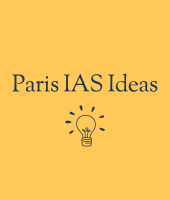Paris IAS Ideas
Le cycle "Paris IAS Ideas" propose des présentations courtes de chercheurs de l'Institut d'études avancées de Paris suivies d'échanges avec le public. Ces séances marquent le début de résidences d'écriture d'un mois au cours desquelles ces chercheurs invités rédigeront un article présentant la version "définitive" d'une idée ou d'un concept sur lequel ils travaillent depuis des années.
Ces courtes présentations de 20 minutes seront suivies de discussions interdisciplinaires avec des chercheurs en sciences sociales et humaines. Chacun est invité à participer et à contribuer aux débats qui alimenteront le travail de nos chercheurs-résidents pendant leur séjour.
Informations pratiques
Toutes les présentations auront lieu en anglais et en ligne sur Zoom.
Veuillez consulter la programmation détaillée ci-dessous pour connaître les intervenants et les horaires de chacun. Inscription au cas par cas.
Programme détaillé
vendredi 8 septembre 2023
- Juan Pablo Caicedo (Universidad Javeriana, Colombia – Bogota City Administration) – Reimagining Urban Transportation: Green Corridors as Catalysts for Materializing a 15-minute City in Bogotá
vendredi 6 octobre 2023
- 14h - Paul Rozin (University of Pennsylvania) – Food worlds of French and American
- 15h - Virginia Valian (Hunter College - CUNY) – Are executive functions immutable?
- 16h - Tamar Flash (Weizmann Institute of Science, Rehovot, Israel) – Connections between our modeling work on space-time geometries and the brain
Vendredi 10 novembre 2023
- 14h - Jim Hollan (UCSD) – Network-of-Networks Collaboratory to Address the Grand Challenge of the Future of Information Work at the Human-Technology Frontier
- 15h - Angelo Torre (Università del Piemonte Orientale, Italy) – Commons as local institutions
- 16h - Zhiyuan Cui (Tsinghua University) – Interrogating Modernity: Hans Blumenberg and Roberto Unger Compared
Vendredi 8 décembre 2023
- 14h - Jonathan Glasser (William & Mary University) – Patrimony as Inalienability
- 14h40 - Vladimir Pinheiro Safatle (Sao Paulo University) – Nature can only exist where it is destroyed: Politically constructing freedom as heteronomy without servitude
Vendredi 5 janvier 2024
- 14h - Andrea Pinotti (Università Statale di Milano) – Cyber-Theo. Reflections on the Theological roots of Contemporary digital Technologies
- 14h30 - Uichol Kim (Inha University) – Understanding the software of the mind, co-creativity, and cultural transformations: With a specific focus on the secrets to happiness, success, and sustainable communities
- 15h - John Krumm (University of Southern California) – Personal data privacy
- 15h30 - Margo Boenig-Lipstin (ETH Zürich) – Science, society and the human: Emergence of a constitutional model of the human in 1980s STS
Vendredi 2 février 2024
- 14h - Jean Decety (University of Chicago) – Exploring the dark side of morality
- 14h40 - Philippe Rochat (Emory University) – The need for self-abandonment and stepping out of mind
- 15h20 - Robert Darnton (Harvard University) – “Grub Street Revisited”
Vendredi 8 mars 2024
- 14h - Helga Nowotny (ETH Zurich – ERC) – The Illusion of Control
- 14h40 - Sergejus Muravjovas (Transparency International Lithuania) – Devising a novel anti-corruption approach to reduce bribery in healthcare
- 15h20 - Alberto Fergusson (Universidad del Rosario) – Applications of Accompanied Autoanalysis (Selfrehabilitation) (AA) in novel scenarios
Vendredi 5 avril 2024
- Björn Wittrock (Academia Europeae, Swedish Collegium for Advanced Study) – Nature of Key Transformative Processes in the Contemporary Era
- Itzhak Fried (UCLA) – The Brain that Pull the Triggers: New Insights into Syndrome E
- Barry Rogers (London School of Economics) – Shaping the energy transition: exploring the behavioral underbelly of transformational deal-making in a global energy firm
Vendredi 3 mai 2024
- Ed Hutchins (UCSD)– Generative AI meets distributed cognition and cognitive ethnography
- Leslie-Anne Duvic-Paoli (King’s College London) – Legislating on climate change: Insights from citizens’ assemblies
- Leor Zmigrod (University of Cambridge) – The Science of Ideological Consciousness: Building an Empirically-Informed Political Philosophy of Mind
Vendredi 7 juin 2024
- Alena Ledeneva (University College London) – Informality: 50 years on
- Raluca Grosescu (National University of Political Science and Public Administration, Bucharest, Romania) – Corporate Accountability for Gross Human Rights Violations: A Fragmented Cause
- Robert Desjarlais (Sarah Lawrence College, New York) – A critical phenomenology of experience
- Patrick Haggard (University College London) – An intellectual history of the “Libet experiment”
- Enrique Fatas (Universidad Europea, Spain) – The intersectional discrimination dual index
- Lina Restrepo-Plaza (Universidad Europea, Spain) – Decomposing discrimination towards ex-combatants and victims of conflicts


